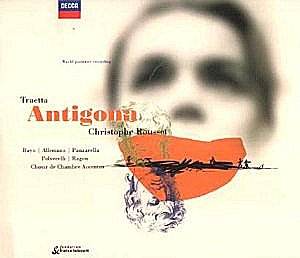Tommaso TRAETTA
Antigona
 Bayo/Allemano/Panzarella/Polverelli/Ragon, Accentus/Les
Talens Lyriques cond. Christophe
Rousset,
Bayo/Allemano/Panzarella/Polverelli/Ragon, Accentus/Les
Talens Lyriques cond. Christophe
Rousset,
 DECCA L'Oiseau-Lyre 460 204-2 [160 mins]
DECCA L'Oiseau-Lyre 460 204-2 [160 mins]
Crotchet
AmazonUK
AmazonUS

Tommaso TRAETTA (1727-1779) was a noted member of the Neapolitan composers
of the period, travelling widely for productions of his operas, including
a period in London, and settling finally in Venice. This opera to Sophocles'
tragedy was premiered in 1772 at St Petersburg, where Traetta had succeeded
Galuppi as Catherine the Great's maestro di corte. The libretto by
Colellini was generally praised for its creative freedom, whilst respecting
the ethical background with 'Pity and Terror'. To sample Antigona
at its best, try the first scene of Act 2, in which the grieving Antigone
conducts a forbidden funeral ceremony for her brother, supported by a chorus
of her loyal serving maids.
Carlo Vincenzo Allemano is resolute and brings authority with perfect diction
as her father Creon, the King who sees it his paramount duty to uphold law,
however savage that be, and remains implacable until he relents in the nick
of time and acknowledges that 'foolish glory' had 'crushed the voice of nature'.
Gilles Ragon sings well to present an elder citizen, a voice of reason wishing
for an end to the pursuit of Oedipus 'down to the last of his line'.
Maria Bayo, the eponymous heroine who dominates the action in a demanding
part for soprano drammatico di agilita as Oedipus' daughter, is
affecting, though her vibrato is at times not entirely to my taste. Of the
other singers, I enjoyed Anna Maria Panzarella as her supportive but fearful
sister and Laura Polverilli as Creon's son and Antigone's destined husband,
who in their first act duet offers reassurance that all will come right in
the end. He is of course eventually proved right, but not until the screws
have been tightened with cliff-hangers on the way, before the reprieve which
we all expected.
The happy ending, with nuptial celebrations for Antigone and Hemon, is a
little perfunctory, and I do not quite endorse Antigona's rating as
a rediscovered masterpiece. The rich orchestration includes horns and clarinets,
with bassoons prominent as 'the voice of Nemesis' an added attraction, and
the playing of the specialist players under Christophe Rousset is always
alert and in good style. Documentation, with illustrations and translations
is comprehensive, and this release will not disappoint collectors of rare
baroque opera.
Peter Grahame Woolf

